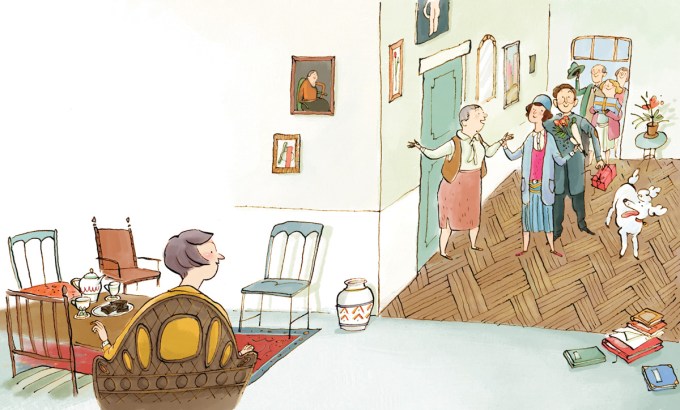An Illustrated Fictional Day in the Real Lives of Alice B. Toklas and Gertrude Stein
By Maria Popova
One September afternoon in her thirtieth year, during her first day as an American expat in Paris, Alice B. Toklas (April 30, 1877–March 7, 1967) found herself seated across from “a golden brown presence, burned by the Tuscan sun and with a golden glint in her warm brown hair” — a woman dressed in a brown corduroy suit, who talked little and laughed a lot, and whose voice seemed to Alice to emanate from the large coral brooch pinned to her chest. That enchanting woman was the thirty-three-year-old Gertrude Stein (February 3, 1874–July 27, 1946), who was as enthralled with Alice as Alice was with her. From that day on, and until death did them part four decades later, they would share their lives. Gertrude would paint a loving “word portrait” of Alice, address her as “baby precious,” and leave nightly notes by her pillow to be discovered in the morning, signed “Y.D.” — “Your Darling.” Alice, whom Gertrude called “wifey,” would record their lives in an unusual cookbook and a memoir.
In Happy Birthday, Alice Babette (public library), author Monica Kulling and illustrator Qin Leng invite the imagination into Gertrude and Alice’s world through a tender fictionalized day in the couple’s real life.
The book opens with an epigraph by Stein:
It takes a lot of time to be a genius, you have to sit around so much doing nothing, really doing nothing.
The story begins on a day when Gertrude has been so busy doing nothing that she has forgotten Alice’s birthday — or so Alice thinks when she wakes awaiting a surprise and none arrives. We see the couple breakfasting on croissant and tea in silence, their beloved French poodle named Basket sleeping nearby, as though it were any ordinary day.
Perplexed and disheartened that Gertrude hasn’t so much as wished her happy birthday, Alice decides to spend the day walking through Paris. She has no idea that Gertrude is writing her a birthday poem and cooking her a special birthday dinner.
But there is one major problem: Gertrude doesn’t know how to cook, not even how to turn the stove on — she spends all her days writing, while Alice is in charge of domestic duties.
Still, determined, Gertrude proceeds with her plan — she goes to the market with Basket, asks a neighbor to show her how to operate the stove, and all the while is composing the poem in her head.
Meanwhile, Alice is enjoying her date with herself — she goes to the park, rides the carousel, and sees a puppet theater show.
Back at home, Gertrude is in the flow of her plan, almost self-congratulatory at the ease with which he has taken to cooking.
As she puts the main course on the stovetop and pops the cake into the oven, the perfect poem line intrudes on her imagination and she rushes to her study to write it down.
But in a testament to William James’s timeless wisdom on dividing attention, multitasking takes its toll — her mind, aswirl with words and lines of poetry, loses track of time.
Suddenly, the smell of smoke alerts her to the reality of the burnt cake, “the saddest dessert that Gertrude had ever seen.”
Just then, Alice saunters in, having had her fill of joys in the city.
Upon finding the scene of the kitchen disaster, she doesn’t get angry but swiftly and expertly cleans everything up and bakes a batch of brownies (not to be confused with her famous hashish fudge) as Gertrude transforms her cooking misadventure into a story.
As the couple sits down to enjoy the treats, the doorbell rings — a group of friends Gertrude had invited for the ill-fated surprise dinner pours in to wish Alice a happy birthday. They eat, drink, and laugh, and Gertrude reads her birthday poem, which Alice loves — a happy, if unpredictable, birthday indeed.
Although Happy Birthday, Alice Babette is absolutely charming, I do wish Gertrude weren’t referred to as Alice’s “friend” throughout, as no heterosexual husband would be referred to as his wife’s “friend” — what a missed opportunity to teach kids that love takes many shapes and forms families of many kinds. Still, the sweetness and sincerity of their love rises above the language and radiates from the story itself. Complement it with a very different nonfiction picture-book about a fragment of Gertrude and Alice’s life, then revisit these wonderful LGBT children’s books celebrating diversity and difference.
Illustrations courtesy of Groundwood Books
—
Published August 8, 2017
—
https://www.themarginalian.org/2017/08/08/happy-birthday-alice-babette/
—






















ABOUT
CONTACT
SUPPORT
SUBSCRIBE
Newsletter
RSS
CONNECT
Facebook
Twitter
Instagram
Tumblr